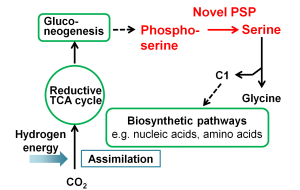Novel phosphoserine phosphatases

A research group of the Graduate School of Agricultural and Life Sciences, the University of Tokyo discovered that serine, one of the fundamental amino acids for life, is synthesized by the activity of novel enzymes in a hydrogen-oxidizing autotrophic bacterium, Hydrogenobacter thermophilus. The genes of the novel enzymes exist over a broad range of organisms, suggesting that serine is also synthesized by the novel enzyme in these organisms.
Serine is synthesized from phosphoserine by phosphoserine phosphatase (PSP) in many organisms. Only one-type of PSP, which is present from microorganisms to higher organisms, had been reported so far. Therefore, a organism which lacks the PSP gene is considered to lack the ability to produce serine from phosphoserine. However, this finding by a team led by Associate professor Masaharu Ishii and former Ph.D. student Yoko Chiba reveals that organisms possessing novel types of PSPs can produce serine even though they lack classical PSPs.
This finding is very important for understanding the diversity and the evolution of amino acid biosynthetic pathways fundamental for life. This discovery is also important from an industrial perspective because these autotrophic bacteria can produce valuable materials from carbon dioxide.
Press release (Japanese)
Paper
Yoko Chiba, Kenro Oshima, Hiroyuki Arai, Masaharu Ishii, and Yasuo Igarashi,
“Discovery and analysis of cofactor-dependent phosphoglycerate mutase homologs as novel phosphoserine phosphatases in Hydrogenobacter thermophilus,”
Journal of Biological Chemistry Vol. 287, Issue 15, 11934- 11941, APRIL 6, 2012, doi: 10.1074/jbc.M111.330621.
Article link








